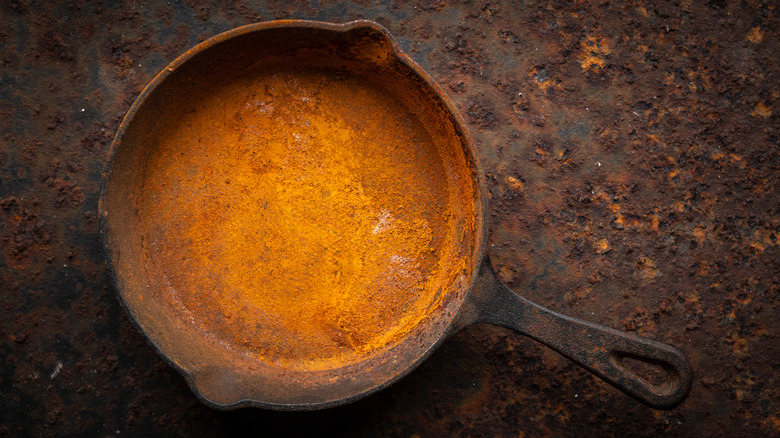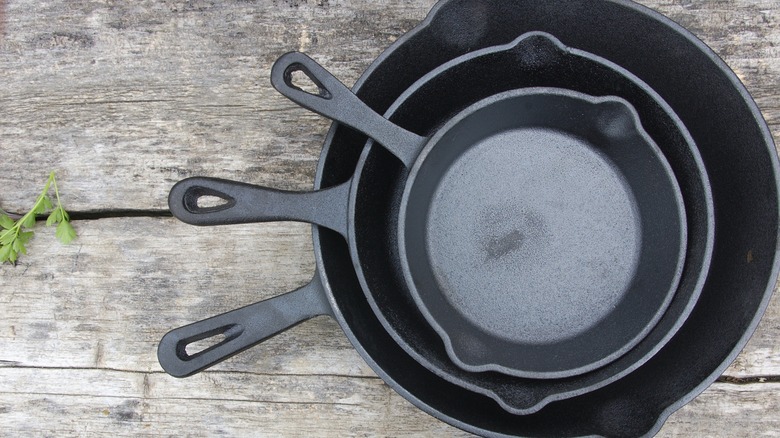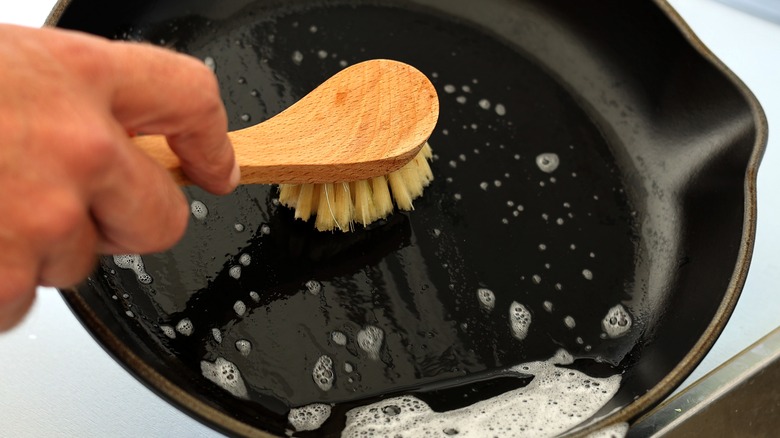It's So Easy To Prevent Your Cast Iron Skillet From Rusting
In the wide world of kitchen equipment, few pieces of cookware are as respected as the cast iron skillet. These pans are inexpensive, durable, versatile, nonstick, and keep heat very well. They're even a natural source of iron because food cooked in cast iron can absorb trace amounts of the healthy mineral. Cooks have been using various kinds of cast iron cookware since the fifth century BCE, and aside from improved technology, the process of making cast iron has remained largely unchanged. Molten iron is poured into a mold, and allowed to cool down. The mold is then taken apart, and the cast iron skillet comes out intact.
Unfortunately, cast iron is also susceptible to rusting. Rust, also known as iron oxide, forms when iron comes into contact with water and oxygen. Given that cooking can put cast iron near water, this exposure is pretty much inevitable. Your solid black cast iron pan can quickly become corroded with unattractive patches of brown, but the discoloration isn't the biggest concern you should have about rust. Although iron is an essential component of a healthy diet, the U.S. Department of Agriculture reports that rust is not food-safe, so it's important to keep your cast iron clean. Although prepping cast iron for cooking and then maintaining it can get involved, it's pretty easy to prevent rust from forming on cast iron by keeping the cookware dry.
Rust never sleeps -- on properly seasoned cast iron
A sports truism is the best defense is a good offense. Similarly, the best way to keep cast iron cookware rust-free is to take precautions. Seasoning cast iron is the first step in this protective process. To season a cast iron skillet, coat the entire pan with a thin layer of neutral cooking oil. Wipe off any extra oil; the pan should be almost dry. Place the oiled skillet into an oven heated to 350 degrees Fahrenheit, and leave it for about an hour so the oil can bake into the cast iron. Turn off the oven, and leave the skillet in the oven until it has cooled.
Note: Most cast iron cookware is pre-seasoned and ready to cook with right away. However, even pre-seasoned cast iron will need to be reseasoned fairly often; either lightly after each time it's cooked with; or more thoroughly every month or so.
Keep your seasoned cast iron clean and rust at bay with a scouring with coarse salt. It's easy: Sprinkle a tablespoon or three on the cooking surface, and scrub the salt around with a dishcloth or paper towel. After the cast iron is clean, wipe out the salt and pitch it. Rinse your cookware with warm water, and dry it thoroughly with a clean dishcloth or fresh paper towel. Put the skillet on a burner, warm it on medium heat for three to five minutes, then wipe it with a thin layer of oil.
How to clean and maintain rusty cast iron
If minor rust has formed, a quick wash may be required. To get rid of pervasive rust, your skillet might need a thorough scrubbing. Don't soak it in hot, soapy water or run it through your dishwasher — these strategies work for other types of cookware but allow cast iron to be in water for too long. Instead, wet your rusty skillet, squeeze a dot of dish soap on the surface, grab a sturdy sponge or steel wool, and get to work. The more rust on your cast iron skillet, the more you'll have to scrub. Something to note: It's a commonly held belief that soap shouldn't be used on cast iron. This belief is from when cleaning products contained harsh chemicals; today's less severe soaps are usually safe to use.
Wet cast iron cookware should be hand-dried immediately, as air drying gives rust time to form. Once your cast iron is dry, it will need to be reseasoned. If your cast iron skillet was corroded with rust, you will need to re-season it the same as you would for never-seasoned cast iron. If your skillet is rust-free and just dirty from cooking or has only minor rust that's been removed, a simple oil wipe-down should be enough to re-season it. Be mindful of where you store your cast iron skillet — keeping it in a humid environment, such as near your sink, can cause cast iron to slowly oxidize.


